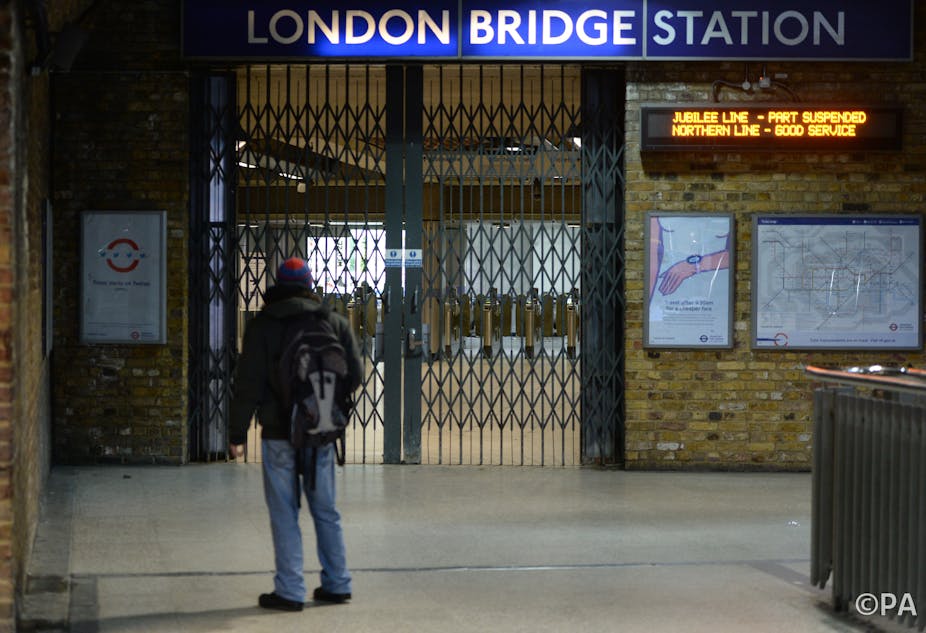Londoners will be pleased that the latest tube strike has been called off. But that hasn’t stopped people from speculating as to how much it might have cost the capital’s economy.
Last week, newspapers quoted sources claiming the tube strike would cost £50m per day, based on a 2007 survey conducted by a business lobby group.
Now, that number has increased to £300m per day as a different business lobby group uses the same faulty methodology.
So where do these numbers come from? In relation to the first figure, Alf Crossman, an industrial relations expert at the University of Surrey, said, “In such cases, more often than not, people pluck figures out of thin air.”
Crossman found the source for the old £50m figure is a survey conducted in 2007 by the London Chamber of Commerce and Industry (LCCI), a business lobby group. For the survey, conducted in partnership with pollsters ComRes, the LCCI asked 315 of its members in “all sectors from across the capital” about the probable impact of the strikes on their business. (Although the total number of members from 2007 was not shared by LCCI, they now have more than 2,500 members.)
We asked the LCCI to explain the methodology used to calculate the economic damage caused by a tube strike, but they declined. According to James Laird of the Institute for Transport Studies at the University of Leeds, “Unless you get hold of the methods at a detailed level and pore over them you will never know the answer.”
As Crossman writes on The Conversation, “Research based on a small sample of biased respondents speaking seven years ago is not the most rigorous way to assess costs.”
£600m flaw
The new £600m figure, given as the cost over the two days of strikes last week, comes from the Federation of Small Business (FSB). The FSB’s figure is based on a survey similar to the LCCI’s. Unlike LCCI, however, they have shared their methodology for review.
They conducted a “snap poll” of their own 2,611 members in the south east of England. Around 600 replied, of which 106 were London-based. A little more than half of those 106 reported that the tube strikes had a negative impact on their business. Those London-based businesses who had reported a negative impact – now just 61 FSB members from the original sample of over 600 – estimated the financial cost to their firms, which FSB averaged to be £1,297
Then, based on data from the Office of National Statistics, they found that London has nearly 800,000 small businesses. If like their tiny survey suggested, 58% of them also suffered negative impact of £1,297 per business, then multiplying those two numbers puts the total loss to London businesses at £600m.
There are three problems here. First, the survey is too small to draw such a conclusion. Second, the survey is biased because the lobby group is asking its own members to report how it affected them. Third, as Phil Almond at De Montfort University points out: “Most of the 800,000 businesses are one-person operations – that is, self-employed or shell companies.” And these one-person operations are unlikely to be affected by the tube strike.
As Crossman points out, unions always overstate the level of support for their strikes, whereas employers’ organisations such as the Federation of Small Businesses and the LCCI tend to overstate the economic damage. Almond said, “The figures produced by such surveys are meant to play into the agenda of the lobbying group.”
The true economic impact of such strikes is hard to calculate accurately, but that doesn’t stop lobby groups from throwing big numbers around. For instance, the 2010 national rail strike was claimed to have cost the economy £600m per day. The source of that figure was a quote from a spokesperson of the Federation of Small Businesses, who said, “A 10% absence from work will cost the UK around £600m.” No support could be found for the claim that a rail strike would lead to 10% work absence.
In 2005, New York City’s subway and bus workers went on strike for the first time in decades, the economic damage was judged to be about US$400m per day. As we anticipated last week, someone could easily outdo these estimates, and FSB has just done that.

